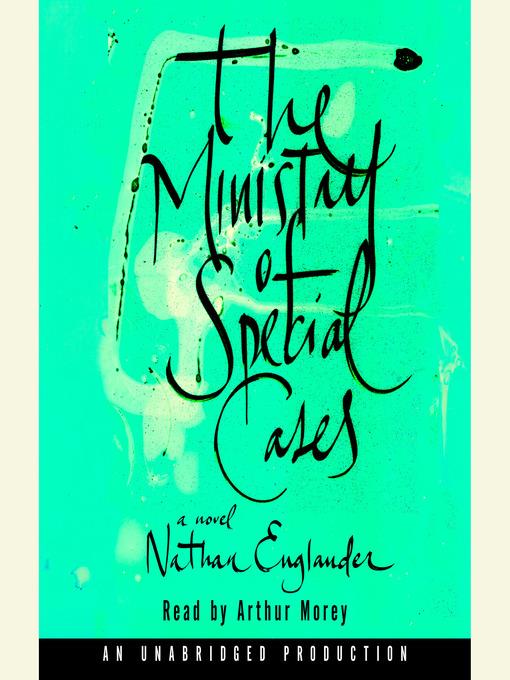
The Ministry of Special Cases
کتاب های مرتبط
- اطلاعات
- نقد و بررسی
- دیدگاه کاربران
نقد و بررسی

Arthur Morey transports listeners to Buenos Aires, 1976, during Argentina's "dirty war." Morey hits just the right sardonic note as protagonist Kaddish Poznan, "hijo de puta" (son of a whore), who nightly rewrites history by removing the names of Jewish whores and pimps from gravestones for their respectable children who are embarrassed by their parents' jaded pasts. As Kaddish, Morey is thoughtful, philosophical: "I offer a face-lift for the family name." With wife Lillian and son Pato, Kaddish lives in a world in which Gogol meets Kafka. Morey is especially strong when Pato is taken away in a government-green Ford Falcon and his parents are forced to approach the Ministry of Special Cases for assistance. The novel is a chilling reminder of the way a nation can disappear into totalitarian oblivion. S.J.H. (c) AudioFile 2007, Portland, Maine

May 28, 2007
Morey’s dulcet theatrical tones offset the messy lives of the characters in Englander’s first novel about Jewish residents of 1970s Buenos Aires who live in fear of Argentina’s vicious military dictatorship. Against the backdrop of the dirty war conducted against leftists and activists, Kaddish Poznan scratches together a living vandalizing the gravestones of Jewish criminals who are embarrassments to their families, even in eternal slumber. Morey struggles manfully with the book’s religious terminology and outbursts of Spanish, but his reading is too mannered to render the vibrancy of Englander’s prose. His pauses are often too long, and his line readings sometimes lean awkwardly, and puzzlingly, on certain words. Nonetheless, Morey’s professional assurance means that, certain flaws notwithstanding, his reading flows along without overly noticeable interruption, accurately conveying the menace lurking behind every word, every sentence of Englander’s death-haunted tale. Simultaneous release with the Knopf hardcover (Reviews, Mar. 19).

March 19, 2007
Reviewed by
Allegra Goodman
Young writers are often told to write about what they know. In his 1999 collection, For the Relief of Unbearable Urges
, Nathan Englander spun the material of his orthodox Jewish background into marvelous fiction. But the real trick to writing about what you know is to make sure you know more as you mature. Englander's first novel, The Ministry of Special Cases
, conjures a world far removed from "The Gilgul of Second Avenue." The novel is set in 1976 in Buenos Aires during Argentina's "dirty war." Kaddish Poznan, hijo de puta
, son of a whore, earns a meager living defacing gravestones of Jewish whores and pimps whose more respectable children want to erase their immigrant parents' names and forget their shameful activities. Kaddish labors in the Jewish cemetery at night. His hardworking wife, Lillian, toils in an insurance agency by day, and their idealistic son, Pato, attends college, goes to concerts and smokes pot with his friends. When Pato is taken from home, Kaddish learns what it really means to erase identity, because no one in authority will admit Pato has been arrested. No one will even acknowledge that Pato existed. As Lillian and Kaddish attempt to penetrate the Ministry of Special Cases, Englander's novel takes on an epic quality in which Jewish parents descend into the underworld and journey through circles of hell.
Gogol, I.B. Singer and Orwell all come to mind, but Englander's book is unique in its layering of Jewish tradition and totalitarian obliteration. At times Englander's motifs seem forced. Kaddish, whose very name evokes the memory of the dead, chisels out the name of a plastic surgeon's disreputable father, and in lieu of cash receives nose jobs for himself and his wife. Lillian's nose job is at first unsuccessful, and her nose slides off her face. One form of defacement pays for another. Kaddish fights with his son in the cemetery and accidentally slices off the tip of Pato's finger. Attempting to erase a letter, Kaddish blights a digit. But the fight seems staged, Pato's presence unwarranted except for Englander's schema. Other scenes are haunting: Lillian confronting bureaucrats; Kaddish appealing to a rabbi to learn if it is possible for a Jew to have a funeral without a body; Kaddish picking an embarrassing embroidered name off the velvet curtain in front of the ark in the synagogue. When he picks off the gold thread, the name stands out even more prominently because the velvet underneath the embroidery is unfaded, darker than the rest of the fabric. Englander writes with increasing power and authority in the second half of his book; he probes deeper and deeper, looking at what absence means, reading the shadow letters on history's curtain. (May)
Allegra Goodman is the author of five books, including
Intuition.

September 15, 2007
Argentinas Dirty War of 1976 is the focus of Englanders first novel. Kaddish, his wife, Lillian, and their son, Pato, live uneasily in Buenos Aires even before Pato is taken away for having objectionable books. Efforts to find him lead the couple to the nightmarish bureaucracy of the Ministry of Special Cases. In treating such subjects as identity and history as a Jewish fable, Englanders work invites comparison with more compelling predecessors such as Bernard MalamudsThe Assistant and Jonathan Safran FoersEverything Is Illuminated . While Foer successfully melds two stories, Englander seems to be struggling to balance his lovely character portraits with his political allegory. Arthur Morey gives a lackluster reading of the work, which might be the problem; Englander is an author of worthy ambitions and obvious talent, and reviews of the book itself have been strong. Recommended only where Englanders books have been popular.Michael Adams, CUNY Graduate Ctr.
Copyright 2007 Library Journal, LLC Used with permission.

























دیدگاه کاربران